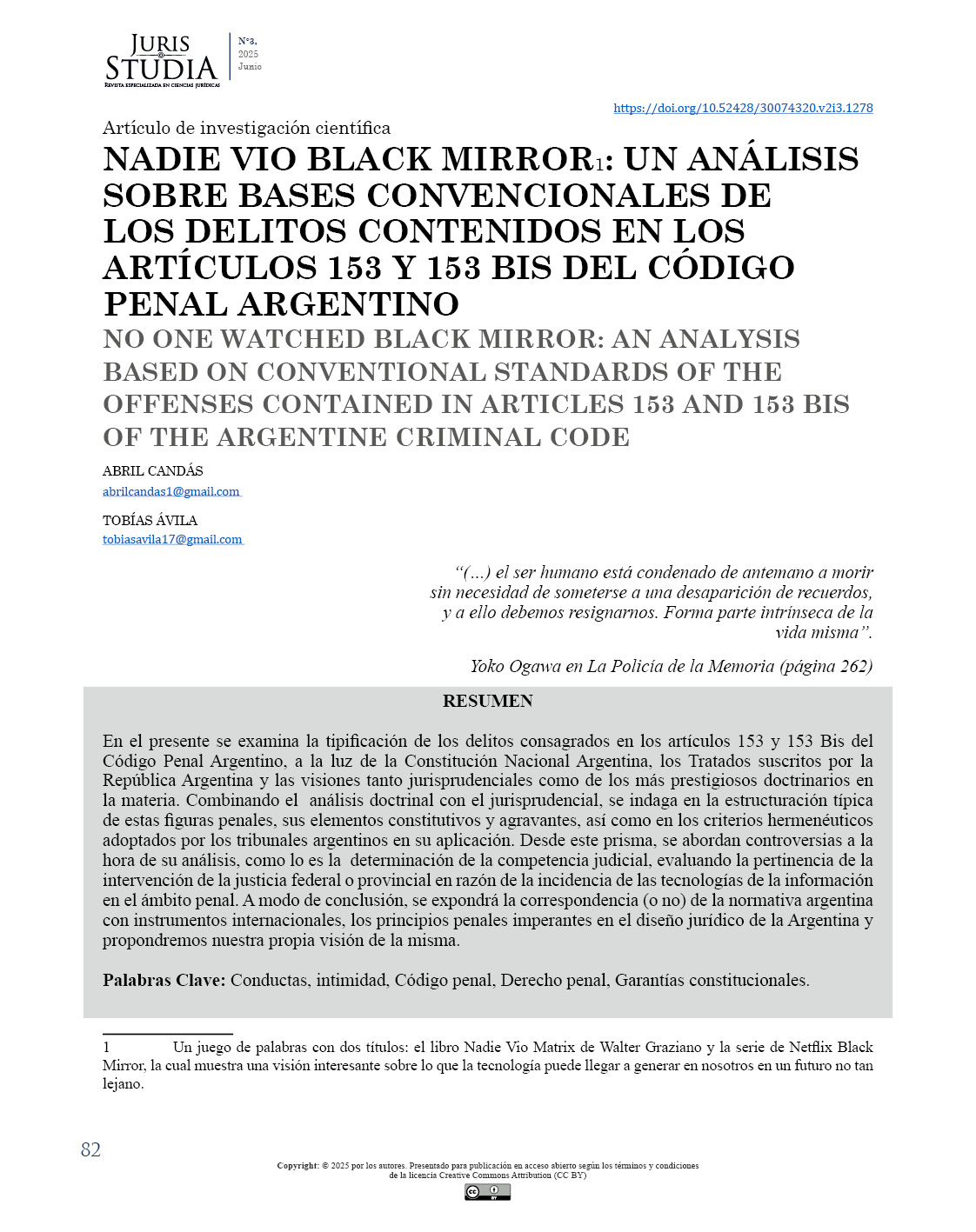NOBODY SAW BLACK MIRROR: AN ANALYSIS OF THE CONVENTIONAL BASES OF THE CRIMES CONTAINED IN ARTICLES 153 AND 153 BIS OF THE ARGENTINE PENAL CODE
DOI:
https://doi.org/10.52428/30074320.v2i3.1278Keywords:
Conductas, Intimidad, Código penal, Derecho penal, Garantías constitucionalesAbstract
This study examines the codification of the offenses enshrined in Articles 153 and 153 Bis of the Argentine Penal Code, considering the Argentine National Constitution, international treaties ratified by the Argentinian Republica, and the perspectives of both jurisprudence and the most esteemed doctrinarians in the field. By combining doctrinal and jurisprudential analysis, this work explores the typological structure of these criminal offenses, their constitutive elements and aggravating factors, as well as the interpretative criteria adopted by Argentine courts in their enforcement. From this perspective, it addresses key controversies in their legal assessment, particularly the determination of judicial jurisdiction, evaluating whether federal or provincial courts should preside over these matters given the increasing impact of information technologies on criminal law. In conclusion, the study will examine whether Argentine legislation aligns with international legal instruments, the prevailing principles of criminal law within Argentina’s legal framework and will ultimately put forward our own perspective on the matter.
References
Aboso, E. [et ál]. (2012). Ciberdelitos: Análisis Doctrinal y Jurisprudencial [Libro Digital, EPUB]. elDial.com
Altmark. D. R. y Quiroga, E. M. (2012). Tratado de Derecho Informático (Tomo III) [Libro Digital]. La Ley.
Barrio Andrés, M. (2020) Ciberdelitos 2.0. Astrea.
Buompadre, J. E. (2009) Derecho Penal Parte Especial. Astrea.
Fontán Balestra, C. (2013). Tratado de Derecho Penal Parte Especial (Tomo II) Edición Actualizada y Ampliada. La Ley.
Cámara Criminal de Apelaciones en lo criminal y Correccional de la Capital Federal, Ciudad Autónoma de Buenos Aires (1999, 4 de marzo). Sentencia Número Interno 10.389 - ID SAIJ: FA99060001. Carátula: Lanata Jorge s/ Desestimación. Disponible en: https://www.saij.gob.ar/camara-nacional-apelaciones-%20criminal-correccional-nacional-ciudad-autónoma-buenos-%20aires-lanata-jorge-desestimacion-fa99060001-1999-03-%2004/123456789-100-0609-9ots-eupmocsollaf
Concejo de la Unión Europea. (2001, 23 de noviembre). Convenio sobre la Ciberdelincuencia. Serie de Tratados Europeos N°185. https://www.oas.org/juridico/english/cyb_pry_convenio.pdf
Congreso de la Nación Argentina. (Sancionada en 1853 y siendo su última reforma en 1994). Constitución de la Nación Argentina. http://servicios.infoleg.gob.ar/infolegInternet/anexos/0-4999/804/norma.htm
Congreso de la Nación Argentina. (1921). Ley N°11.171. Código Penal de la Nación Argentina. http://servicios.infoleg.gob.ar/infolegInternet/anexos/15000-19999/16546/texact.htm
Congreso de la Nación Argentina. (1972). Ley Nacional de Telecomunicaciones. https://www.argentina.gob.ar/normativa/nacional/ley-19798-31922/actualizacion
Congreso de la Nación Argentina. (2015). Ley N°27.146. Ley de Organización y Competencia de la Justicia Federal y Nacional Penal. http://servicios.infoleg.gob.ar/infolegInternet/anexos/245000-249999/248174/texact.htm
Corte Suprema de Justicia de la Nación Argentina. (2017). ID SAIJ: FA1700007. Carátula: Toia, Gustavo Walter s/ violación sist. Informático (art. 153 bis 1er párrafo del C.P. Disponible en https://www.saij.gob.ar/corte-suprema-justicia-nacion-federal-ciudad-autonoma-buenos-aires-toia-gustavo-walter-violacion-sist-informatico-art-153-bis-1-parrafo-fa17000077-2017-09-19/123456789-770-0007-1ots-eupmocsollaf
D'Alessio, A. y Divito, M. (2009). Código Penal Comentado y Anotado: 2da Edición Actualizada y Ampliada (Tomo II). La Ley.
Donna, E. A. (2011). Derecho Penal: Parte Especial (Tomo II - A) Segunda Edición Actualizada y Reestructurada. Rubinzal - Culzoni.
Dupuy, D. [et ál]. (2018). Cibercrimen II. Editorial B de F.
Molina, G. (2021). Derecho Penal Parte Especial. ConTexto Libros.
Palazzi. P. A. (2016). Los Delitos Informáticos en el Código Penal. Análisis de la Ley 26.388 [Libro Digital]. Abeledo Perrot S.A.
Parada, R. A. y Errecaborde, J. D. [ét al]. (2018). Cibercrimen y Delitos Informáticos: Los Nuevos Tipos Penlaes en la Era de Internet - Suplemento Especial. Erreius.
Parma, C.; Mangiafico, D. y Álvarez Doyle, D. (2019). Derecho Penal - Parte Especial. Hammurabi
Riquert, M. A. [et ál]. (2020). Cibedelitos. Hammurabi.

Downloads
Published
How to Cite
Issue
Section
License
Copyright (c) 2025 Tobías Avila, Abril Candás

This work is licensed under a Creative Commons Attribution 4.0 International License.
Authors who publish with this journal agree to the following terms:
- Authors retain copyright and grant the journal right of first publication with the work simultaneously licensed under a Creative Commons Attribution License 4.0 that allows others to share the work with an acknowledgement of the work's authorship and initial publication in this journal.
- Authors are able to enter into separate, additional contractual arrangements for the non-exclusive distribution of the journal's published version of the work (e.g., post it to an institutional repository or publish it in a book), with an acknowledgement of its initial publication in this journal.
- Authors are permitted and encouraged to post their work online (e.g., in institutional repositories or on their website) prior to and during the submission process, as it can lead to productive exchanges, as well as earlier and greater citation of published work.










